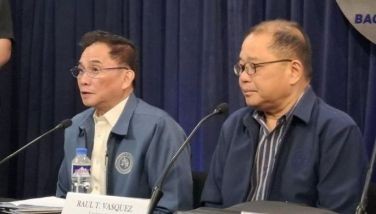Running voting
The runoff system
Instant-runoff voting (IRV) is a voting in which voters rank candidates in the order of preference. If no candidate receives a majority of first choices, the candidate with the fewest number of votes is eliminated and the vote casts for that candidate are redistributed to the remaining candidates according to the voters indicated preference. Simply stated, when there are several candidates aspiring for the same post, a process of elimination takes place such as the candidate or candidates obtaining the least number of votes is eliminated. Depending on the rules or what had been adopted, only two candidates shall remain in the final voting. Evidently, the system or the process may call for a series of runoff elections or perhaps even one for the purpose of eliminating the other candidates. The IRV is sometimes referred to as Alternative voting in the
Since the adoption of the 1987 Philippine Constitution the electoral system or landscape in the country has changed. Under Article IX of the Constitution in relation to COMELEC, a free and open party system shall be allowed to evolve according to the free choice of the people (Sec. 6). Unlike the practice before, political parties shall not be represented in the voters’ registration boards, boards of election inspectors and board of canvassers (Sec. 8). But even with this banning and non-participation of political parties, there has been a marked proliferation of political parties especially with the adoption of the party-list system. This also is reflected in the number of candidates for President and Vice-President.
The 1992, 1998 and 2004 Presidential elections
In 1992, there were seven Presidential candidates, Fidel V. Ramos, with votes of 5,342,521; Miriam Defensor Santiago, 4,468,173; Eduardo Cojuangco Jr., 4,116,376; Ramon Mitra Jr., 3,316,661; Imelda Marcos, 2,338,294; Jovito Salonga, 2,302,123 and Salvador Laurel, 770,046. The votes for President Ramos represented only 23.58% of the total votes cast while
In the Presidential elections of 1998, there were ten candidates: Joseph Estrada, with 10,722,295 votes; Jose De Venecia, 4,268,483; Raul Roco, 3,720,212; Emilio Osmeña, 3,347,631; Alfredo Lim, 2,344,362; Renato De Villa, 1,308,352; Miriam Defensor Santiago, 797,206; Juan Ponce Enrile, 343,139; Santiago Dumlao, 32,212 and Manuel Morato, 18,644. Estrada’s votes represented 39.86% while his closest rival De Venecia had 15.87% of the total votes cast. Even with his popularity and overwhelming lead over De Venecia, Estrada failed to get a clear majority (39.86%) due obviously to the number of candidates who vied for the same post.
In the 2004 Presidential elections, the candidates were Gloria Macapagal Arroyo, 12,905,808 votes; Fernando Poe Jr., 11,782,232; Panfilo Lacson, 3,510,080; Raul Roco, 2,08,762 and Eduardo Villanueva, 1,988,218. President Arroyo’s votes represented 39.99% of the total votes cast; while FPJ’s votes represented 36.15% and Lacson had 10.88%. Even with only five candidates, the total votes were likewise divided among themselves and the winner in that election also failed to get a clear majority. If the runoff system was applied, the contest would have been confined between President Arroyo and FPJ and there would have been a clear mandate enabling the winner to govern effectively.
Summation
It is interesting to watch on television the primaries now being held in the
The question now is whether we can adopt the runoff system without changing the fundamental law. If found beneficial with many candidates vying for the same post as shown in the 1992, 1998 and 2004 elections, there should be a study to find out if the runoff system can be adopted by mere legislative act. To be sure, under the present system it is said, that the people or the voters are given the wider choice of choosing the candidates. But as shown in the past elections, the number of candidates in the field resulted in the denial of a clear mandate to the winner, unlike if there were only two candidates vying for the same post. Anyway the runoff system has been found effective in many countries, and it is therefore worthwhile to study that system. Personally, I believe we can adopt this system without amending the Constitution. It is after all a procedural mechanism or what is known as adjective law which prescribes the manner or procedure by which rights maybe enforced. It will not defy, transgress nor even disturb any substantive provision in the present Constitution, more particularly Sec. 4, Art. VII of the Constitution on the Executive Department. Besides, the runoff system retains or enhances the system of direct popular election by achieving for the winner in the electoral process a clear mandate and consequently enabling him or her to govern effectively.
(Writer is a former Solicitor General; Philippine Envoy to
- Latest





















